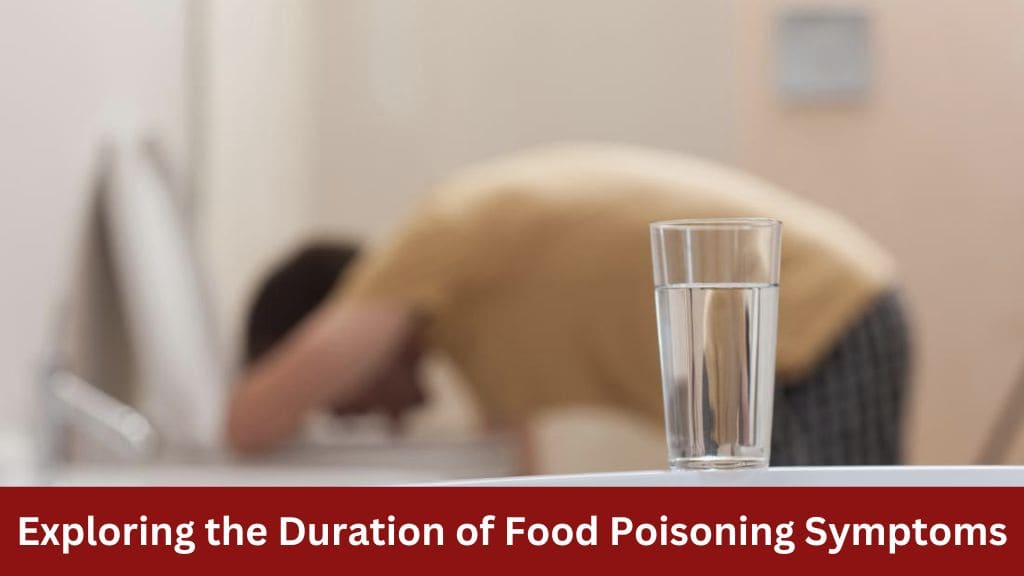Food poisoning is a common and potentially serious illness caused by consuming contaminated food or beverages. While symptoms can vary widely depending on the type of bacteria, parasite, or virus involved, understanding the timeline of food poisoning is crucial for proper diagnosis and treatment. In this blog post, we’ll explore the duration of food poisoning, from onset to recovery, and discuss factors that can influence its timeline.
Understanding the Onset of Food Poisoning

Factors Influencing Incubation Period
- Type of Pathogen: Different pathogens have distinct characteristics that influence their incubation periods. For instance, bacteria like Salmonella and Campylobacter typically have shorter incubation periods, ranging from 6 to 72 hours. In contrast, viruses such as norovirus may lead to symptoms within 12 to 48 hours.
- Amount of Contaminated Food Consumed: The quantity of contaminated food or beverages ingested plays a significant role in determining the onset of symptoms. Generally, larger doses of pathogens can lead to a more rapid onset of illness. Therefore, individuals who consume a significant amount of contaminated food may experience symptoms sooner than those who ingest smaller quantities.
- Individual Immune Response: The body’s immune system plays a crucial role in defending against pathogens. Individuals with robust immune systems may exhibit a delayed onset of symptoms or may be less severely affected by food poisoning. Conversely, those with weakened immune systems, such as young children, older adults, pregnant women, and individuals with chronic illnesses, may experience faster onset and more severe symptoms due to reduced immune function.
Variability in Incubation Periods
It’s essential to recognize that the onset of food poisoning can vary from person to person and even within the same individual over time. Factors such as age, overall health, and the specific strain of pathogen involved can all influence the timing and severity of symptoms.
Additionally, some pathogens may have longer incubation periods or unpredictable patterns of symptom onset. For example, certain bacterial toxins, such as those produced by Staphylococcus aureus, can lead to rapid-onset symptoms within a few hours of ingestion. In contrast, other pathogens, such as Listeria monocytogenes, may cause symptoms to develop gradually over several weeks.
Importance of Understanding Onset
Understanding the onset of food poisoning is crucial for several reasons. Firstly, it aids in identifying the source of contamination and tracing back to the implicated food or beverage. By determining the timeline between consumption and symptom onset, individuals can pinpoint the likely cause of their illness, facilitating appropriate investigation and preventive measures.
Moreover, knowledge of the typical incubation periods associated with different pathogens can assist healthcare providers in making accurate diagnoses and providing timely treatment. Recognizing the signs and symptoms of food poisoning early on allows for prompt medical intervention, reducing the risk of complications and promoting faster recovery.
Timeline of Food Poisoning Symptoms

The timeline of food poisoning symptoms refers to the sequence of events from the ingestion of contaminated food or beverages to the onset, duration, and resolution of symptoms. Understanding the timeline is crucial for identifying the source of contamination, diagnosing the illness, and providing appropriate medical care.
Onset of Symptoms
The onset of food poisoning symptoms typically occurs within hours to days after consuming contaminated food or beverages. This period, known as the incubation period, can vary depending on several factors:
- Type of Pathogen: Different pathogens have distinct characteristics that influence their incubation periods. For example, bacteria like Salmonella and Campylobacter often cause symptoms to develop within 6 to 72 hours after ingestion, while viruses like norovirus may lead to symptoms within 12 to 48 hours.
- Amount of Contaminated Food Consumed: The quantity of contaminated food ingested can affect the onset of symptoms. Larger doses of pathogens may lead to a more rapid onset of illness, while smaller doses may result in a delayed onset.
- Individual Immune Response: The body’s immune system plays a significant role in determining how quickly symptoms develop and how severe they are. Individuals with weakened immune systems, such as young children, older adults, pregnant women, and those with chronic illnesses, may experience faster onset and more severe symptoms.
Duration of Symptoms
The duration of food poisoning symptoms can vary widely depending on factors such as the severity of the infection, the type of pathogen involved, and individual health status:
- Mild Cases: Mild cases of food poisoning typically resolve within a few days with self-care measures and supportive treatment. Symptoms such as nausea, vomiting, diarrhea, abdominal cramps, and fever may gradually improve over this time.
- Severe Cases: Severe cases of food poisoning, particularly those involving certain bacteria or toxins, can lead to more prolonged illness. Symptoms may persist for several days to weeks and may require medical intervention, including antibiotics and supportive care.
Recovery
Most cases of food poisoning resolve on their own with appropriate treatment and self-care measures. However, some individuals may experience lingering effects or complications that require medical attention and ongoing management.
- Hydration and Nutrition: Maintaining hydration and adequate nutrition is essential during recovery from food poisoning, especially in cases involving vomiting and diarrhea. Replacing lost fluids and electrolytes can help prevent dehydration and support the healing process.
- Rest and Recovery: Rest is crucial during the recovery period to allow the body to recuperate and regain strength. Avoiding strenuous activity and consuming bland, easily digestible foods can help support the healing process.
Duration of Food Poisoning Symptoms

The duration of food poisoning symptoms refers to the length of time that individuals experience illness following exposure to contaminated food or beverages. While the duration can vary widely depending on factors such as the severity of the infection, the type of pathogen involved, and individual health status, understanding the typical course of food poisoning symptoms is essential for proper management and recovery.
Mild Cases
In mild cases of food poisoning, symptoms may resolve relatively quickly with self-care measures and supportive treatment. These cases often involve common pathogens such as norovirus or certain strains of bacteria that cause gastrointestinal upset without severe complications.
Up to a Few Days: Mild cases of food poisoning typically last anywhere from a few days to a week. During this time, individuals may experience symptoms such as nausea, vomiting, diarrhea, abdominal cramps, and mild fever. While these symptoms can be uncomfortable, they generally improve with rest, hydration, and over-the-counter remedies to alleviate discomfort.
Severe Cases
In contrast, severe cases of food poisoning can lead to more prolonged illness and may require medical intervention to manage symptoms and prevent complications. These cases often involve pathogens that cause more severe gastrointestinal or systemic effects, such as certain strains of bacteria or toxins produced by pathogens like Clostridium botulinum.
Several Days to Weeks: Severe cases of food poisoning can last anywhere from several days to weeks, depending on the specific pathogen and individual health factors. Symptoms may be more intense and persistent, requiring medical treatment to alleviate symptoms and prevent dehydration or other complications. In some instances, particularly with bacterial infections like E. coli O157:H7 or Listeria monocytogenes, symptoms may persist for an extended period and may necessitate hospitalization or specialized care.
Long-Term Effects
While most cases of food poisoning resolve without long-term consequences, some individuals may experience lingering effects or complications following recovery. These long-term effects can vary depending on factors such as the severity of the infection, the individual’s overall health, and the specific pathogen involved.
Chronic Health Conditions: In some cases, food poisoning may trigger or exacerbate chronic health conditions such as irritable bowel syndrome (IBS), reactive arthritis, or Guillain-Barré syndrome. These conditions can lead to ongoing symptoms and may require ongoing medical management to control symptoms and improve quality of life.
Importance of Prompt Treatment
Prompt recognition and treatment of food poisoning symptoms are essential for minimizing the duration of illness and preventing complications. Individuals experiencing severe or prolonged symptoms, such as persistent vomiting, high fever, or signs of dehydration, should seek medical attention promptly to receive appropriate treatment and supportive care.
Recovery and Long-Term Effects

Recovery from food poisoning involves the resolution of symptoms and restoration of normal bodily functions following exposure to contaminated food or beverages. While most cases of food poisoning resolve without long-term consequences, some individuals may experience lingering effects or complications that require medical attention and ongoing management.
Recovery Process
The recovery process from food poisoning can vary widely depending on factors such as the severity of the infection, the type of pathogen involved, and individual health status. In general, the following steps are involved in the recovery process:
- Symptom Resolution: The first stage of recovery involves the resolution of symptoms such as nausea, vomiting, diarrhea, abdominal cramps, and fever. As the body eliminates the causative pathogen and inflammation subsides, symptoms gradually improve.
- Hydration and Nutrition: During recovery, it’s essential to focus on maintaining hydration and adequate nutrition. Dehydration is a common complication of food poisoning, especially in cases involving severe vomiting and diarrhea. Replacing lost fluids and electrolytes through oral rehydration solutions or intravenous fluids may be necessary to prevent dehydration.
- Rest and Recovery: Rest is crucial during the recovery period to allow the body to recuperate and regain strength. Avoiding strenuous activity and consuming bland, easily digestible foods can help support the healing process.
Long-Term Effects
While most cases of food poisoning resolve without long-term consequences, some individuals may experience lingering effects or complications following recovery. These long-term effects can vary depending on factors such as the severity of the infection, the type of pathogen involved, and individual health status:
- Chronic Health Conditions: In some cases, food poisoning can trigger or exacerbate chronic health conditions such as irritable bowel syndrome (IBS), reactive arthritis, or Guillain-Barré syndrome. These conditions may lead to ongoing symptoms such as abdominal pain, joint inflammation, or neurological dysfunction, requiring ongoing medical management and support.
- Organ Damage: Severe cases of food poisoning, particularly those involving certain bacteria or toxins, can lead to organ damage or dysfunction. For example, infections with E. coli O157:H7 or Listeria monocytogenes may result in kidney failure or meningitis, respectively. Prompt medical intervention is essential to prevent complications and minimize long-term effects.
- Psychological Impact: The experience of severe food poisoning can have a psychological impact on affected individuals, leading to feelings of anxiety, fear of future illness, or changes in dietary habits. Counseling or support services may be beneficial for individuals struggling to cope with the aftermath of food poisoning.
Importance of Follow-Up Care
Following recovery from food poisoning, it’s essential for individuals to undergo appropriate follow-up care to monitor for any lingering symptoms or complications. This may involve regular check-ups with a healthcare provider, laboratory tests to assess organ function, or referrals to specialists for further evaluation and management.
Prevention Strategies

Preventing food poisoning involves implementing proper food handling, preparation, and storage practices to minimize the risk of contamination and illness. By following food safety guidelines, individuals can reduce their likelihood of experiencing foodborne illness and promote overall health and well-being.
Hand Hygiene
Proper hand hygiene is essential for preventing the spread of harmful bacteria and viruses that can cause food poisoning. Individuals should wash their hands thoroughly with soap and water before and after handling food, especially raw meats, poultry, and produce. Additionally, hands should be washed after using the toilet, changing diapers, smoking, blowing the nose, coughing, sneezing, or touching animals.
Cooking Temperatures
Cooking foods to their recommended internal temperatures is crucial for killing harmful bacteria and ensuring food safety. Use a food thermometer to verify that foods such as poultry, beef, pork, and seafood are cooked to the appropriate temperature. Ground meats should be cooked to at least 160°F (71°C), while poultry should reach a minimum internal temperature of 165°F (74°C). Leftovers and casseroles should be reheated to 165°F (74°C) to kill any bacteria present.
Food Storage
Proper food storage helps prevent the growth of harmful bacteria and reduces the risk of foodborne illness. Refrigerate perishable foods promptly to prevent bacterial growth, and discard any perishable items that have been left at room temperature for more than two hours. Set refrigerators at 40°F (4°C) or below and freezers at 0°F (-17°C) to maintain optimal temperatures for food storage.
Avoid High-Risk Foods
Certain foods pose a higher risk of foodborne illness and should be avoided or handled with caution:
- Unpasteurized Dairy Products: Avoid consuming unpasteurized milk, cheese, and other dairy products, as they may contain harmful bacteria such as Salmonella, E. coli, or Listeria.
- Raw or Undercooked Meats and Eggs: Cook meats, poultry, seafood, and eggs thoroughly to kill any bacteria present. Avoid consuming raw or undercooked meats, eggs, and seafood to reduce the risk of foodborne illness.
- Cross-Contamination: Keep raw meats, poultry, seafood, and their juices separate from ready-to-eat foods to prevent cross-contamination. Use separate cutting boards, utensils, and plates for raw meats and produce, and wash hands and surfaces thoroughly after handling raw foods.
Hygienic Food Handling Practices
Practicing hygienic food handling is essential for preventing contamination and reducing the risk of foodborne illness:
- Wash Fruits and Vegetables: Thoroughly wash all fruits and vegetables under running water before consuming or cooking them to remove dirt, bacteria, and pesticides.
- Clean Surfaces and Utensils: Wash cutting boards, utensils, and countertops with hot, soapy water before and after preparing food to prevent cross-contamination.
- Sanitize Surfaces: Use a solution of one quart of water mixed with one teaspoon of bleach to sanitize surfaces and utensils after they have been washed to kill any remaining bacteria.
Conclusion
Food poisoning can have a significant impact on health and well-being, with symptoms ranging from mild gastrointestinal upset to severe illness requiring medical intervention. By understanding the timeline of food poisoning, recognizing common symptoms, and taking preventive measures, individuals can reduce their risk of contamination and promote food safety in their homes and communities. If experiencing symptoms of food poisoning, seeking prompt medical attention is essential for proper diagnosis and treatment.





